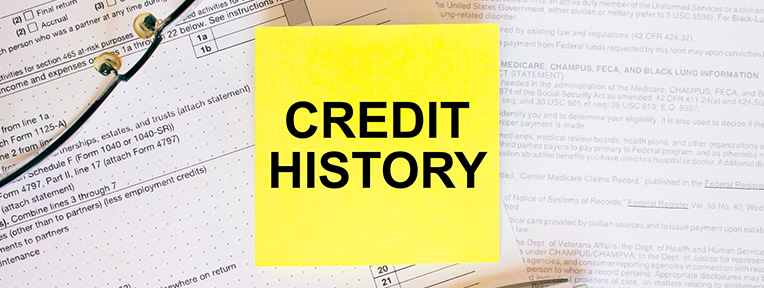
What Is Credit History?
Posted on Tuesday, December 17th, 2024 | By IndusInd Bank
When you apply for a personal loan, there are many aspects of your credit health that the bank takes into consideration. One of the key elements of your credit health that will be in focus during the process is your credit history.
As the term suggests, it is a reflection of your past credit behaviour and includes your previous borrowing and repayment conduct. The more you know about what credit history is and how it affects your present credit prospects, the better prepared you will be to have a smoother loan application process. Let’s dive into the concept, its different types, and how it affects your chances of getting a loan approved.
Understanding Credit History in Detail
- The term ‘credit history’ refers to all aspects of your previous credit behaviour. This can include your various credit accounts, due balances, missed or timely payments, defaults, and so on. You can also refer to it as your credit record.
- Most of your credit information is reflected in your credit report. The credit bureaus keep a record of your credit history and portray it in a methodical format in a document known as the ‘credit report’. Your credit history is also an important element in determining your credit score.
- When you apply for an instant personal loan, you authorise the lender to seek your credit history. They will also assess your creditworthiness.
- The state of your credit history affects your loan application, including the loan amount and the interest rate you are eligible for.
Now that you know what credit history is, let’s see how it affects your personal loan application process.
Also Read: Instant Personal Loans: A Convenient Answer to Your Financial Requirements
Types of Credit History
Your credit history generally falls under three broad categories, each having a unique impact on your loan eligibility.
Good Credit History
A good credit history indicates that you’ve borrowed responsibly and repaid on time. This includes making timely EMI payments, maintaining a low credit utilisation ratio, and avoiding defaults. A long and stable credit track record without any negative remarks improves your chances of getting approved for loans at favourable terms.
Bad Credit History
If you’ve missed payments, defaulted on loans, or overutilised your credit limit frequently, you may have a bad credit history. Lenders consider this risky behaviour, which can lead to higher interest rates, lower sanctioned loan amounts, or even outright rejection of your application.
No Credit History
Those who have never taken a loan or used a credit card often fall under the no credit history category. While this doesn’t mean you’re unreliable, the absence of any repayment track record makes it difficult for lenders to assess your risk profile. This can limit your options or result in less favourable loan terms.
Difference Between Credit History, Credit Report, and Credit Score
These terms are often used interchangeably but mean different things:
- Credit History: Your past record of credit activity — loans taken, repayments made, defaults, etc.
- Credit Report: A comprehensive document prepared by credit bureaus that includes your credit history and other relevant data like personal details, active accounts, and payment status.
- Credit Score: A three-digit numerical summary of your creditworthiness, typically ranging between 300 and 900. A higher score indicates better credit health.
Think of it this way: your credit history is the story, the credit report is the book, and the credit score is the rating.
Effects of Credit History on Personal Loan Application
When you apply for a personal loan, this is how your credit history will affect its application and post-sanction process:
· Loan Approval Chances
A positive credit history with timely payments and extended credit accounts increases your chances of loan approval. It shows that you repay your loans responsibly. Lenders are likely to approve loans for such low-risk individuals. Similarly, a bad credit history can negatively affect your loan application.
· Interest Rates
Credit history also affects the interest rate offered on your personal loan. Individuals with a strong credit score often qualify for lower interest rates. On the other hand, those with poor credit may face higher rates because of the perceived risk.
With knowledge of interest for your personal loan, you can use a personal loan EMI calculator. This tool will give you an estimate of the EMI, so you can budget for your loan accordingly.
· Loan Amount
When you apply for a loan, you must have a specific amount in mind. However, the actual amount you will be eligible for depends to a large extent on your credit history. Banks are more willing to lend larger amounts to those who have previously shown responsible conduct with their credit.
Factors Affecting Credit History
Several factors influence the quality of your credit history. These include:
- Payment behaviour: Late or missed payments reflect poorly.
- Credit utilisation: Using too much of your available credit suggests dependency.
- Credit mix: A healthy mix of secured (home/car loans) and unsecured credit (personal loans, credit cards) is preferred.
- Loan tenures: Long-term relationships with credit accounts can work in your favour.
- Number of credit inquiries: Too many loan or card applications within a short span may negatively impact your history.
How to Build and Maintain Credit History?
Having a good credit history is an indicator of responsible financial behaviour. Here are some ways you can get started:
1. Timely Payments
When you pay your credit card bills and personal loan EMIs on time, it contributes significantly to your credit history. Even missing one payment can have a negative impact.
2. Low Credit Utilisation Ratio
This ratio refers to how much credit you use out of your available credit limit. So, if you have a credit card, it is advisable to not go overboard with its credit limit. Your credit utilisation ratio must be under 30% to ensure a stable credit record.
3. Limited Credit Applications
With every credit application, you face a credit inquiry. Having too many credit inquiries within a short span can lead to a weaker credit record.
4. Stability and Length of Credit Accounts
Having a stable and long credit history shows that you can manage credit over an extended period. This results in banks considering you a low-risk applicant. For similar reasons, it is also advisable to not close credit accounts within a short span of time.
Summing Up
Your credit history is more than just a financial record — it’s a reflection of your borrowing behaviour and financial habits. Whether you’re applying for a personal loan or planning future financial moves, maintaining a strong credit history can unlock better terms, faster approvals, and greater financial freedom.
So, start small, borrow smart, and pay on time — because building a healthy credit history is an investment in your financial future.



 Offers
Offers Rates
Rates Debit Card Related
Debit Card Related Credit Card Related
Credit Card Related Manage Mandate(s)
Manage Mandate(s) Get Mini Statement
Get Mini Statement
 categories
categories Bloggers
Bloggers Blog collection
Blog collection Press Release
Press Release


